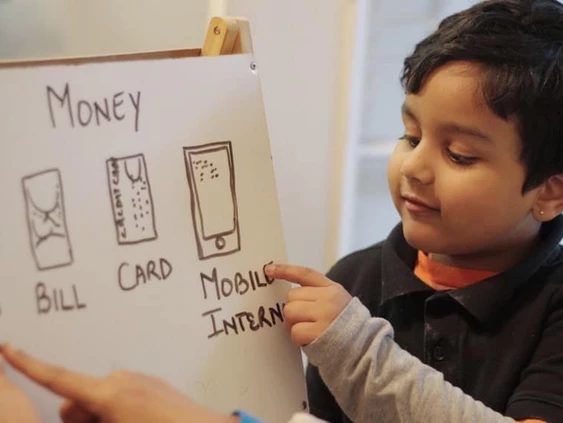If a person doesn’t understand the importance of money, he is unlikely to build a fortune for himself. If he is born to riches, he is just as likely to squander all his money on meaningless pursuits. This can be avoided by teaching our young ones about money early on in their life, in a planned manner.
Affluent parents are often guilty of not discussing finances with their children. On the other hand, the children think of money as a readily available resource that quickly brings in all the necessities and luxuries of life. Eventually, they risk missing out on getting an insight into the plan and effort that goes into earning each penny.
Not all parents give in to the parental instinct of safeguarding their kids from the reality of livelihood struggles. Many well-to-do parents make it a point to gradually inculcate monetary wisdom in their kids from an early age. We often read about celebrities and business tycoons who have made their children learn the value of money with exciting and innovative measures. Books like Rich Dad Poor Dad explain how affluent parents manage to educate their children through their money handling.
As a real-life example, you can look at the billionaire diamond trading family, the Dholakias, who sent their US-returned son to find a regular job and learn livelihood the challenging way. Behind these well-publicised decisions are specific values that many influential people try to imbibe their children with.
How Do Rich People Teach Their Kids About Money?
- An early introduction to the concept of money
- Allowance model
- The value of hard work
- Letting them make financial decisions
- Taking ownership of mistakes
- Not relying on inheritance.
- Learning to give back to the society
1. An early introduction to the concept of money

Children can grasp the concept of money at an early age. Therefore, it is prudent to demonstrate how money can be used to buy and sell things. While it is okay to treat them to a fancy restaurant, they should also understand how less a homemade meal can cost. Children in an affluent household can miss out on counting coins’ simple educational experience and what can be bought with it. Once they understand these concepts, they will realise the initial ideas of saving and budgeting.
2. Allowance model

If you are wondering ,how to teach my kid about the value of money, there is no better way than sticking to an allowance model. There are many ,advantages of giving pocket money to kids from an early age. They will learn money management, earning, hard work and other values of life. As a parent, you can afford all the comfort and luxuries that your kid can ask for, but the child should learn how to live within a budget. Superstar footballer David Beckham goes a step ahead and ensures that his children do their daily chores before paying them pocket money. The Beckham kids have to spend within their allowance and make sure that they do enough to earn it in the first place. It is easy to get spoiled and take money for granted in a $900 million household, but the kids are aware that all of that fortune is not at their disposal.
3. The value of hard work

Be it household work or helping parents with their business, influential people make it a point that their kids understand and appreciate the value of hard work. JRD Tata worked in his parent’s company as an unpaid apprentice at the beginning of his career. While it may seem like a symbolic gesture, his start from the grassroots can be linked to his employee-friendly policies.
Many entrepreneurs ensure that their children do active jobs within the family business before donning a leadership role. An essential part of teen parenting is making sure that the child helps his or her parents in activities like household chores and getting groceries to understand the effort required in simple-looking tasks. An affluent parent can’t and won’t say that “we can’t afford it”. Instead, they would point out that there is plenty of money to be earned through hard work and sound financial decisions.
4. Letting them make financial decisions

It is believed that most children form their money habits by the age of seven. So a parent can guide their financial decision making from quite an early age. Should they spend their allowance now or save it for the amusement park trip planned for the holidays? How many chocolate bars or crisps can they buy if they want to save for a toy car? These are simple and early financial decisions that they can take and figure out themselves. As a parent, you can be a mentor who explains the pros and cons and gives them hindsight. This mixture of independence and guidance can go a long way in moulding their financial decision making.
also read: how to stop your kids from overspending
5. Taking ownership of mistakes

A vital parenting hack, particularly among the well-to-do class, is to make their children own up to mistakes. A foresighted parent wouldn’t let their child squander money or stumble from one financial mistake to another. If they spot a misuse or error, they point out the same to their child so that he or she takes responsibility for the same. This answerability makes them more responsible with money and adds to their financial wisdom. Affluent parents allow their children to use money independently and make mistakes to use it as a learning experience. Their failures and successes will enable them to form an identity that is separate from their established parents.
6. Not relying on inheritance.

Self-made successful parents never relied on inheritance. Instead, they built their roadmap towards success. Such parents generally want to ensure that their children develop the same resilience and doggedness. Bill Gates believes that leaving behind a fortune for children is neither good for the children themselves nor society. He plans to leave behind a “petty” $ 10 million each for his children out of his $ 130 billion fortune. However, this is a gradual process, and Bill and Melinda Gates have raised their kids, preparing them to develop their talents and lead independent lives.
Such an upbringing negates the chances of arrogance and complacency in children, mainly if there is a fortune waiting to be inherited.
also read: useful tips for busy parents to teach their kids about money
7. Learning to give back to the society

Teaching all about money can prepare a young person to be financially successful in the future. However, it is also necessary to instil emotional literacy and understand the importance of a future business leader; today’s children must learn to give and lend a hand to those in need when they grow financially. Influential people develop empathy and philanthropic spirit in their children so that they grow together with the people and society when they grow financially.
As grown-ups, we often hear or talk about one of those “things I wish I knew when I was young”. One such thing is the reasonable and fair use of money. By teaching our kids about it, we can make sure that they don’t regret being financially naïve when they grow old. Instead of cushioning them from the real world entirely, giving our children a guided exposure and education on money can prepare them to be more responsible and astute while handling money.
hope you loved this blog. you might also like:
- top 9 ways how parents can teach their kids about personal finance
- top money management tips to prepare your teenager for the future
- top ways to budget – how to teach the kids?
- what are the top benefits of using credit cards?
- best tips on planning investment as a teenager
- advantages and disadvantages of cryptocurrency in 2022











